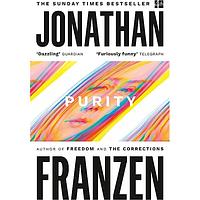Take a photo of a barcode or cover
The writing was largely wonderful, some of the setting was interesting, the story itself was bit cliché. My expectations were quite high and i buzzed through the nearly 600 pages in a short amount of time and again even though it is the best written book i've read since the corrections the depressing story and largely awful characters prevented me from 'loving’ this book. Thus it's a difficult book to rate, but based on my overall opinion of how i felt about it, i have to go with just 3 stars. My chief complaint is in line with woody allen movies, they tend to be masterful shot and put together, but also such absurd self portraits that they are hard to recommend.
Major disappointment for a fan of his earlier works. I'm not sure what he was trying to do, but I'm pretty sure he did't achieve it. It's really only 2.5 stars. His writing isn't bad, but it's a mess of a book with some really big failures (such as not making it the least bit clear why anyone liked Andreas Wolf).
I think Jonathan Franzen is really adept at depicting the endearing, or maybe more ambiguous, aspects of dysfunctional dynamics. I liked that about Freedom, and I think that works really well in this book, too. Overall, this is a really well-written book, and the narrative moves forward really well, but I was less invested in the wiki-leaks-type guy than the other characters, so I found myself trying to get through those sections.
After hearing all the acclaim about Franzen's other books, I went to a book signing for Purity in Nashville. Purity is the first Franzen book I've read and it was a struggle for me. I liked the main character, Purity, and really cared about her.
To me, there was way too much background about the character of Andreas --- and way too much detail about German politics. Another reviewer made a comment about how the book doesn't pick up until page 400. I wholeheartedly agree. I think the stories of all the characters and how they related to one another could have been told more succinctly.
I often thought I was reading a book by a man who thinks he's the smartest person in the world and wants everyone else to know how smart he is, too.
To me, there was way too much background about the character of Andreas --- and way too much detail about German politics. Another reviewer made a comment about how the book doesn't pick up until page 400. I wholeheartedly agree. I think the stories of all the characters and how they related to one another could have been told more succinctly.
I often thought I was reading a book by a man who thinks he's the smartest person in the world and wants everyone else to know how smart he is, too.
I don't think Jonathan Franzen hates women, I think his problem is that he hates everyone.
I'm giving this book three stars because it is basically pretty stupid, but I did enjoy it a great deal.
I really wanted to love this book - the first half was engaging and painted multiple complex characters that I was curious to find out more about. The second half let me down completely, dragging the reader on a 200 page saga of narcissistic ramblings and discussions of morality/government that lost my loyalty to the book completely by the time I reached the conclusion. Would not read this book again unless the second half was rewritten by an author a bit less obsessed with themselves.
Fascinating character study. Reviews that include anything about Franzen hating women are remarkably obtuse, in my opinion, and lack anthropological awareness of what drives human beings who are fully plighted by self-sabotage. Or, more importantly, how they gravitate towards one another.
This story presents a generational domino effect of it, and not a single character, male or female, escapes it. In fact, the primary male character is its purest form, the worst-case scenario of someone hurdling towards their own destruction. Blaming everything but himself. Which the main female character really has more to blame, and doesn't become like him; makes better choices, but not without flaw, and certainly not without being affected by everything she inherited from other flawed humans.
I loved it. I loved how far it goes into the deep, dark, recesses of human frailty and flaw.
To say Franzen just hates the internet and social media is also... obtuse. He was commenting on how humans who suffer from the above, with or without the existence of these things, wield it. Like anything. In the hands of someone addicted to self-sabotage, which is a full detachment from reality and a propensity to craft narrative from nothing, anything is a weapon. Even tools of a virtual reality... especially those, really. As someone who used to be afflicted, I fully get it.
I think anyone saying this book is anti-feminist and internet-hating just proves how little people understand about mental health. That is, truly, a superficial take that misses the point, entirely.
This story presents a generational domino effect of it, and not a single character, male or female, escapes it. In fact, the primary male character is its purest form, the worst-case scenario of someone hurdling towards their own destruction. Blaming everything but himself. Which the main female character really has more to blame, and doesn't become like him; makes better choices, but not without flaw, and certainly not without being affected by everything she inherited from other flawed humans.
I loved it. I loved how far it goes into the deep, dark, recesses of human frailty and flaw.
To say Franzen just hates the internet and social media is also... obtuse. He was commenting on how humans who suffer from the above, with or without the existence of these things, wield it. Like anything. In the hands of someone addicted to self-sabotage, which is a full detachment from reality and a propensity to craft narrative from nothing, anything is a weapon. Even tools of a virtual reality... especially those, really. As someone who used to be afflicted, I fully get it.
I think anyone saying this book is anti-feminist and internet-hating just proves how little people understand about mental health. That is, truly, a superficial take that misses the point, entirely.
I don't know why Franzen is considered a major writer. I abandoned Corrections halfway through because it couldn't hold my interest. I nearly did the same with this one. However, I persevered and reached the end, albeit with a feeling of relief and a determination never to read another book by him.


